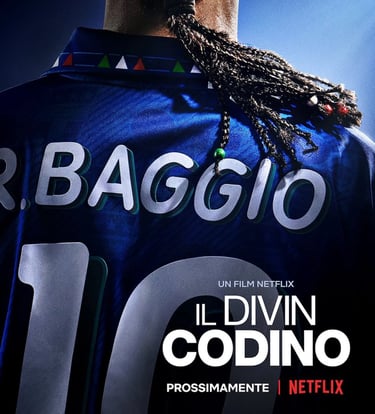Review of Baggio: il Divin Codino
I had my wisdom teeth removed the day Netflix released il Divin Codino. I’d been looking forward to watching it for months. I was drugged from the dentistry, and my jaw wouldn’t stop bleeding. I tried to watch it anyway. I passed out at one point. I didn’t watch it again until recently.
By Adam Faraca, who can still remember where he was
6/18/20254 min read


I had my wisdom teeth removed the day Netflix released il Divin Codino. I’d been looking forward to watching it for months. I was drugged from the dentistry, and my jaw wouldn’t stop bleeding. I tried to watch it anyway. I passed out at one point. I didn’t watch it again until recently.
I really wanted this movie to be good. I’m a huge Baggio fan. I have a few jerseys. I’m even a self-described nonpracticing Buddhist. The 1994 Final was held during Faraca Fest ’94. I watched it at our cottage with my grandfather and great uncle on one of those old TVs that had knobs for UHF and VHF. I was barely eight, but I knew Italy would win because they had Roberto Baggio. When it happened my great uncle cried. He was tough as nails. I once saw him accidentally hit his finger with a hammer and not even flinch. He cried. It was the moment my “I hate soccer” phase began.
I was sour on Baggio, out of childish ignorance, until the 2006 World Cup. I’d adopted the Azzurri as my team in the lead up to 2006. When Materazzi headed the corner in, I whooped aloud. My grandmother was making pasta at the time and smacked me at the base of the skull with a ladle for startling her. I forgave Baggio and scoured the internet for any link between America and Serie A and the Azzurri. I needed a story, a deep cut, to be part of my identity. I found it, and it is going to be a big part of THE COLORS WE BLEED FOR.
The city of Vicenza is one of the settings of THE COLORS WE BLEED FOR and where the story of il Divin Cordino begins. I wanted there to be a deep dive into the culture of Vicenza and Vicenza Calcio. There wasn’t. Baggio spent his formative years there. They glossed over it. He plays for Vicenza for like thirty seconds and then they sell him to Fiorentina. He does basically nothing to endear himself to his home town or his new club, at least not on screen. The Baggio family continues to live there, but somehow the setting never really matters to the plot.
There are a lot of time jumps, back and forth. Baggio spends most of the movie at Fiorentina in the 80s at club level, with the Azzurri in the 90s at national team level, and on the operating table getting his knee done. Then he ends up at Brescia and the movie ends. His struggles and personality clashes with coaches (Arrigo Sacchi being the exception) are also skipped over. His absolute domination at Juventus is ignored entirely. The movie never has a cohesive narrative. It is like a weird montage that goes forward and backward in time for the duration of the movie. It was like Memento, but without Christopher Nolan.
Baggio had complicated relationships with Arrigo Sacchi and Giovanni Trapattoni. The movie has both of them as characters, but it doesn’t actually explore the relationship in any depth. This makes zero sense to me. Those two relationships could have just been the movie. Baggio clashes with Trap while he’s at Juventus. Baggio clashes with Sacchi in 94 and is then excluded from the Euro 96 squad and then Sacchi coaches him again at Milan. Then at the end Trapattoni is the Azzurri coach and Baggio cannot repair the relationship or unburn the bridge he burned. That would have been a great movie. Those three principal characters and Baggio is responsible for his own undoing, even if both coaches were hard to get along with. Instead, Baggio is this adored Buddhist who can’t catch a break. The plot is just weak.
Baggio’s father is the main antagonist, I guess. Which also doesn’t really make sense. Lots of people have emotionally distant parents. Baggio’s dad is just kind of a jerk in the movie, then it ends. His motivations are never really explored. The dad is also more or less the narrator, which also doesn’t make sense. Like why is the bad guy the narrator, or de facto narrator, is he even the bad guy, and why doesn’t the movie focus more on Baggio’s accomplishments on the pitch and how his other relationships were strained?
There are a lot of words associated with Baggio that the movie really just ignores. He’s an icon, a national hero, a diva, uncoachable, a champion, a creative genius, the people’s champion, loved by most, hated by some, and forever haunted and daunted by 1994. Like all of the stuff that makes Baggio himself is just not included in the movie. If you saw it and didn’t know who he was you’d think he was a talented player who randomly became a Buddhist who had probably the most famous penalty miss of all time who was forgiven by an unforgiving public. Which I guess is true, but is a woefully bad biography. The movie fails to fundamentally answer the question of who is Roberto Baggio?
The music is great. The costume design is great. The set design is great. The lighting and color are top notch. Netflix green lit this, and spent money on it. It is less than the sum of its parts. Man, I wanted this movie to be good. The whole of Italy wanted it to be good. It wasn’t TERRIBLE. It just wasn’t very good as a narrative, or cinematically. Not everything gets a good review.
